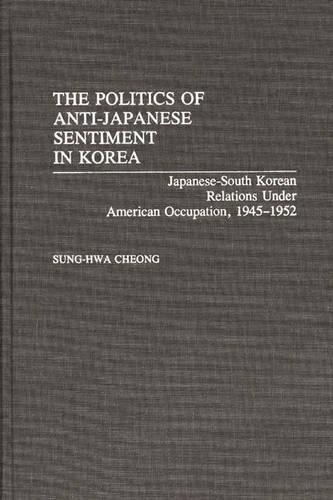
The Politics of Anti-Japanese Sentiment in Korea: Japanese-South Korean Relations Under American Occupation, 1945-1952
(Hardback)
Publishing Details
The Politics of Anti-Japanese Sentiment in Korea: Japanese-South Korean Relations Under American Occupation, 1945-1952
By (Author) Sung-Hwa Cheong
Bloomsbury Publishing PLC
Praeger Publishers Inc
22nd November 1991
United States
Classifications
Tertiary Education
Non Fiction
Asian history
History of the Americas
303.4825195052
Physical Properties
Hardback
208
Width 156mm, Height 235mm
482g
Description
Cheong examines the principal disputes between Japan and South Korea from 1945 to 1952. He argues that as an autonomous force popular anti-Japanese sentiment in Korea did not play a major role in preventing normalization of relations between the two nations. Rather, the diplomatic deadlock was caused by the political posturing of President Syngman Rhee, who manipulated popular anti-Japanese feelings in order to stabilize his regime. The book also addresses how such diplomatic issues as the fishery dispute, financial claims, the territorial dispute, and the legal status of Korean residents in Japan emerged as political weapons in Korea to be manipulated by various political groups to their own advantage. Cheong also evaluates the extent to which the United States tried to assist the normalization of relations between Japan and the ROK as part of its own Cold War strategy in the Far East. He examines the American, Japanese and Korean views toward the San Francisco Peace Treaty and the first conference on normalization. He argues that at this juncture, the Americans were interested in disengagement from Korea rather than in actively forging an anti-Communist alliance between Japan and the ROK. The author concludes that public antagonism toward Japan only became an obstacle to the normalization of diplomatic relations after Rhee deliberately stimulated anti-Japanese sentiment as part of a calculated policy that origniated in his own political insecurity. This analysis aims to shed new light on a shadowy aspect of the history of the Cold War in Asia.
Reviews
. . . Cheong's attempt to provide new insights into this critically important period of Korean history results in a contribution that will be a good reference for students of Korean history and postwar international relations in East Asia.-Book Reviews--South Asia
The complexities and intensities of Korean politics after 1945--in a nation newly liberated from 36 years of brutal Japanese colonial domination--could truly fuse only in a fervent desire for unification of the peninsula. International problems complicated domestic ones; unresolved diplomatic issues with Japan, for example, proved meat for exploitation by Korean politicians. First among them was the imperious and intransigent Syngman Rhee, always ready to manipulate any issue to consolidate and sustain his power. Cheong's book ably dissects Korea's problems with Japan, such as offshore fishing rights, the status of Korean residents in Japan, war reparations, and questions of sovereignty over disputed islands. Cheong provides a straightforward narrative, drawing on freshly read US archival sources as well as on published works in Korean and Japanese. The author writes for scholars or for those with a prior interest in the subject, yet one is glad to have another contribution to the scanty English-language literature on Korean studies.-Choice
." . . Cheong's attempt to provide new insights into this critically important period of Korean history results in a contribution that will be a good reference for students of Korean history and postwar international relations in East Asia."-Book Reviews--South Asia
"The complexities and intensities of Korean politics after 1945--in a nation newly liberated from 36 years of brutal Japanese colonial domination--could truly fuse only in a fervent desire for unification of the peninsula. International problems complicated domestic ones; unresolved diplomatic issues with Japan, for example, proved meat for exploitation by Korean politicians. First among them was the imperious and intransigent Syngman Rhee, always ready to manipulate any issue to consolidate and sustain his power. Cheong's book ably dissects Korea's problems with Japan, such as offshore fishing rights, the status of Korean residents in Japan, war reparations, and questions of sovereignty over disputed islands. Cheong provides a straightforward narrative, drawing on freshly read US archival sources as well as on published works in Korean and Japanese. The author writes for scholars or for those with a prior interest in the subject, yet one is glad to have another contribution to the scanty English-language literature on Korean studies."-Choice
Author Bio
SUNG-HWA CHEONG is Assistant Professor of History at Myonji University in Korea. He has contributed articles to Korea Journal and Japanology.
